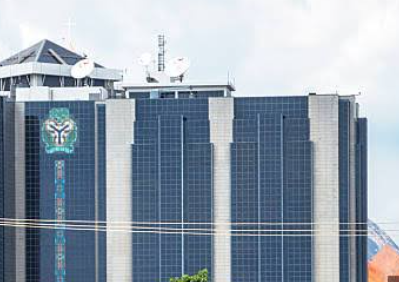News
THE IMPERATIVE OF CBN’S AUTONOMY

BY :IBRAHIM MODIBBOMphil.Ph.D
Under globalization and multi-cultural settings such as ours, Nigerians are under no illusion to the enormity of the myriad of challenges confronting the President Bola Tinubu Administration. In my opinion, anxiety and trepidation seems to trial the move by the National Assembly, to amend the provisions of the CBN Act of 2007. Industry watchers and members of the banking community fear that the attempt to amend the Act will erode confidence in the apex bank, have a negative impact on the banking industry and ultimately, affect the nation’s economy.
In the dynamic landscape of global economics, the independence of central banks stands as a cornerstone for maintaining sound macroeconomic stability and fostering confidence in financial markets. Across all major world economies, from the United States of America, United Kingdom, the developed Asian economies to the European Union, this principle is upheld as a vital aspect of prudent economic management. However, recent proposed amendments to the Central Bank of Nigeria (CBN) Act by the Nigerian Senate threaten to erode this independence or autonomy, putting Nigeria at odds with global best practices and jeopardizing its economic stability going forward. In this piece, we shall examine the critical reasons why preserving the autonomy of the CBN is imperative for Nigeria’s economic future.
It is crucial that we fully understand and appreciate the significance of maintaining the Central Bank’s independence. An independent central bank is critical for ensuring that monetary policy is conducted without political interference. This autonomy allows central banks to implement policies that focus on long-term economic health, such as controlling inflation, stabilizing the currency, and promoting sustainable economic growth. In major economies, central bank independence has been instrumental in achieving these goals. The Federal Reserve in the United States, the European Central Bank, and the Bank of England all operate independently of their respective governments, ensuring that monetary policy decisions are based on available economic data and analysis rather than political whims.
While commendably the idea of the proposed amendments to the CBN Act aim to enhance compliance and strengthen corporate governance, some of the key aspects pose significant threats to the bank’s autonomy. One of such proposal is the creation of a Coordinating Committee for Monetary and Fiscal Policies. This committee, dominated by fiscal authorities including the Ministry of Finance, would have a considerable influence on monetary policy decisions. Such an arrangement risks subordinating monetary policy to fiscal objectives, undermining the CBN’s ability to achieve its primary mandate of price stability in the economy. Apparently, this is a step in the wrong direction in the management of the Nigerian economy.
Fiscal policy, which is the cardinal responsibility or primary function of the Ministry of Finance, encompasses a range of activities related to government spending and taxation. This policy area involves the allocation of government resources, management of public funds, and implementation of tax regulations, all aimed at influencing the country’s economic conditions positively. While the effective coordination between fiscal and monetary policy is desirable, giving fiscal authorities dominance over the CBN compromises the bank’s ability to act independently. This fiscal dominance could lead to short-term policy decisions that prioritize immediate fiscal needs over long-term economic stability. For instance, the government might pressure the CBN to keep interest rates artificially low to reduce borrowing costs, even if such a policy could lead to higher inflation and other economic vulnerabilities.
Another alarming aspect of the current amendment process at the hallowed precincts of the Nigerian Senate pertains to the insistence on subjecting the Central Bank of Nigeria’s yearly budget to approval by the National Assembly. This proposed measure raises significant apprehensions regarding the potential politicization and interference in the operations of the Central Bank of Nigeria. The approval process could result in undue delays of monetary policy decisions, hindering the CBN’s ability to respond swiftly and effectively to economic challenges. In an environment where rapid decision-making is often essential, this could prove detrimental to Nigeria’s economic health.
Global best practices emphasize the need for central bank independence to ensure economic stability and investor confidence. Across the world today, major and emerging economies adopt this framework to ensure a situation of a more stable and predictable economic environments. For Nigeria to diverge from this path would not only isolate it from the global business community but also undermine investor confidence, leading to potential capital flight, increased borrowing costs from multilateral institutions, and a general loss of economic credibility as well as downward grading by global rating organizations.
The proposed amendments, particularly the inclusion of the Coordinating Committee for Monetary and Fiscal Policies, represent a concerning shift towards fiscal dominance. This committee’s role in determining interest rates on the CBN’s temporary advances to the federal government is especially problematic. With the committee chaired by the Minister of Finance as proposed in the current amendment and ostensibly dominated by fiscal authorities, there is a clear conflict of interest. Such a structure inherently favors fiscal objectives over monetary prudence, jeopardizing the delicate balance and the thin line required for sound macroeconomic management. The CBN should rather be encouraged to foster effective prudential guidelines in management of its advances to the federal government as enshrined in the current Act.
The potential for political interference in the CBN’s operations extends beyond the management of the monetary policy. It threatens the very fabric of Nigeria’s economic governance. An autonomous central bank acts as a check on government excesses, ensuring that fiscal policy does not compromise long-term economic stability. By undermining the institutional and operational autonomy, the proposed amendments risk eroding this safeguard and shield, potentially leading to economic policies driven by political rather than economic considerations.
While the Nigerian Senate’s intentions to amend the CBN Act may stem from a desire to enhance governance and performance by the apex, the proposed measures threaten to undermine the very foundation of effective economic management. Eroding the CBN’s autonomy not only contradicts global best practices but also risks plunging Nigeria into a cycle of political interference and economic quagmire.
It is therefore imperative that the Senate reconsider some key aspects of these amendments as enunciated here, preserving the CBN’s independence as a cornerstone of Nigeria’s economic policy framework. Only by doing so can Nigeria ensure a stable, predictable, and resilient economic future, in line with global standards and best practices. The nation’s economic health and international standing depend on it.
While admitting that some of the proposed amendments to the CBN Act are commendable as they are designed to entrench the culture of compliance, strengthen corporate governance, and reposition the apex bank for improved performance in attaining its mandate, most analysts however, say some of the major proposed amendments to the CBN Act appear to erode the bank’s autonomy and weaken the independence of monetary policy, at variance with international best practices.
For example, the proposed coordinating committee for monetary and fiscal policies concerning monetary policy in their opinion will undermine the apex bank’s independence and capacity in achieving its price stability mandate, including fiscal and monetary policy coordination as well as undermining the CBN’s operational independence and weaken the apex bank’s flexibility in deploying appropriate policy frameworks in a dynamic economic environment to achieving its core mandate.
Similarly, the proposed amendment to the CBN Act by the lawmakers will promote undue political interference in purely economic matters, as the fiscal authority would dominate the proposed committee’s membership and chairmanship. Subjecting the CBN’s budget to National Assembly approval will also undermine its institutional autonomy and introduce the potential for political interference in monetary policy which could lead to significant delays in monetary policy implementation and hinder swift monetary policy responses with potential negative implications for macro-economic stability.
According to Dr. Williams Puye an economic and financial expert, some of the proposed amendments threaten the independence and operational autonomy of the CBN as the country’s monetary authority. He asserted that the inclusion of the coordinating committee for monetary and fiscal policies in determining the rates of interest on the apex bank’s temporary advances to the federal government will not only erode the bank’s operational autonomy, but also breed conflict of interest since the committee is chaired by the minister and dominated by fiscal actors.
The now controversial amendment bill to the CBN Act is sponsored by Senator Mukhail Adetokunbo Abiru and co-sponsored by all 41 senators of the Senate Committee on Banking, Insurance and other Financial Institutions and proposes the establishment of a 7-member coordinating committee for monetary and fiscal policies to be chaired by the minister of finance, to among other things set internally consistent targets of monetary and fiscal policies that are conducive to controlling inflation and promoting financial conditions for sustainable economic growth.
It sets the tenure of the CBN Governor and Deputy Governors at a single non-renewable term of six years, appointment of a minimum of one career staff of the bank in the committee of governors, the appointment of at least one female among the External Directors as a Board member, that the five external directors should hold office for a non-renewable term of five years (one year less than the six-year tenure of the governor and deputy governors.
The amendment further proposes the establishment of the position of chief compliance officer in the rank of a Deputy governor, who reports directly to the Board and may occasionally be summoned to appear before the relevant committee of the National Assembly, limit temporary advances to the federal government, including modalities for the issuance of new legal tender to replace existing ones, providing that the withdrawal of the old legal tender should be carried out in phases and in a manner that does not cause any distortion to economic activities, while the apex bank should be in possession of sufficient new currency, not less than 70 percent of the old stock of currency to be withdrawn before embarking on such a programme.
In the area of Board governance, based on the fact that the CBN governor also serves as the Board chairman, the bill proposes that the board committees should be headed by non-executive directors instead of the deputy governors. The bill further proposes to amend the paid-up capital of CBN to N1trillion and that this figure may be increased from time to time by such amount as the government may approve either by way of transfers from the general reserve fund or by such other means as the government, in consultation with the board may approve.
Another notable provision of the bill states that the CBN governor must appears on a semi-annual basis whilst the National Assembly in the exercise of its constitutional duties should reserve the power to invite the governor to make presentations from time to time as the need arises. It also proposes the publishing of a monetary policy report and an interim financial report every six months that should be submitted to the president and the National Assembly within one month of the reference period.
It adds that where the governor fails to make a report to the president and the National Assembly as required by law, he shall be served with a warning letter by the National Assembly and if the failure persists, by a recommendation from the National Assembly for the governor’s suspension from office by the president.
Most significantly, the bill proposes that the budget approved by the CBN board can only be implemented upon the consideration and approval of the relevant committees of the National Assembly.
It goes without saying that safeguarding the independence of the Central Bank of Nigeria is crucial for maintaining the country’s overall economic stability and fostering investor confidence with a good mix of monetary policy tools. The proposed amendments to the CBN Act, particularly those that threaten the bank’s autonomy, must be reconsidered to ensure Nigeria’s economic future remains secure and safe. The Nigerian Senate must be careful not to exacerbate the current economic woes in the country. Hence, by upholding the principle of central bank independence, Nigeria can align itself with global best practices and ensure a stable and prosperous economic environment for its citizens now and in the future.
Dr. Modibbo is an Abuja based Journalist & Social Commentator on National Issues.
News
SAD! Woman, child electrocuted in Edo

A 32-year-old woman has been reportedly electrocuted by a cable belonging to the Benin Electricity Distribution Company (BEDC).
The woman and her baby were said to be electrocuted to death by a cable beneath a flooded road she was walking on after a heavy downpour.
The incident was said to have occurred on May 7th, 2025 at the Oregbeni area of Benin City, Edo State capital.
The woman, identified as Sarah David, was said to have had her baby strapped on her back when the tragedy occurred.
The cable was said to have fallen from one of the electricity poles in the neighborhood.
An eyewitness who simply identified herself as Edugie said: “the woman was also walking with a toddler believed to be her eldest child when the tragedy struck.
But for a passer-by who quickly rescued the toddler from the water, the entire family would have been wiped out.
“But for a passer-by who quickly rescued the toddler from the water, the entire family would have been wiped out.
“After the incident, some residents in the area called on the authorities of the Benin Electricity Distribution company (BEDC) to interrupt electricity supply to the area after which the corpses were removed from the flooded area.
The incident occurred on May 7th, 2025 at the Oregbeni axis of the Benin-Agbor Road,” the witness stated.
The husband of the deceased woman, Mr Samuel Ibom David bemoaned the death of his wife and baby.
He appealed to members of the public to assist him with funds to pay his late wife bride price and enable him approach her family for proper burial.
The management of Benin Disco were yet to respond to the tragedy at the time of filing this report on Sunday evening.
News
10th House extraordinarily proactive, productive for two years – Speaker Abbas

The Speaker of the House of Representatives Hon. Abbas Tajudeen, has said the 10th House has been proactive and productive since its inauguration almost two years ago.
Speaker Abbas also noted that the Legislative Agenda of the 10th, with far-reaching and ambitious proposals and targets, has produced results.
The Speaker made this known in Abuja on Monday at the inaugural Policy Dialogue on the Legislative Agenda of the House, which had top government officials and organisations at the federal and state levels in attendance. The private sector and the diplomatic corps were also represented.
The event was organised by the Office of the Speaker in conjunction with the Policy and Legal Advocacy Centre (PLAC); the National Assembly Library Trust Fund (NALTF), and the UK International Development.
Speaker Abbas said: “Two years later, I am proud to report that these efforts have yielded results. In terms of legislative output, this House has been extraordinarily proactive and productive. We have introduced a record number of bills and a volume of legislative proposals that is unprecedented at this stage of any assembly.
“More important than quantity, however, is the impact: these bills and motions are geared towards the critical reforms our country urgently needs. Already, many of the significant bills that we passed have received presidential assent.”
The Speaker said the dialogue is “a clear demonstration of our shared effort to promote parliamentary accountability, transparency, and a truly citizen-driven legislature.”
While recalling how the 10th pledged to regularly engage with Nigerians, report on its performance, and adjust its course based on the people’s feedback, the Speaker noted that the dialogue is part of that promise, “serving as a precursor to the upcoming Open NASS Week, where we open our doors to scrutiny and present our midterm progress.”
Speaker Abbas emphasised that the goal of the event is not only to celebrate the House’s achievements but also to candidly examine areas for improvement in the spirit of openness and democratic inclusion. He said that as the House prepares to mark the midpoint of its tenure, it is significant to reflect on its journey so far.
He said: “When the 10th House was inaugurated in June 2023, Nigeria faced significant challenges. The economy was weak, and there were pressing development and security crises. The populace was understandably frustrated and lost hope in democracy’s ability to meet their aspirations. This was followed by the shock of the removal of fuel subsidies, which exacerbated economic hardships and increased public anxiety. We recognised that extraordinary times required an extraordinary response from the legislature.
“Therefore, from the onset, the House dedicated itself to creating and implementing the most ambitious legislative agenda in our history. Designed to deliver good governance, this agenda aims to restore hope in democracy for our people.”
Speaker Abbas pointed out that the Legislative Agenda was not crafted in isolation but a product of extensive consultations with key stakeholders, including ministries and agencies, civil society, and development partners. He recalled how the House produced a comprehensive roadmap to guide its law-making, oversight, and representation from 2023 to 2027.
The Speaker stressed that the House took special care to align its priorities with the ‘Renewed Hope Agenda’ of the President Bola Ahmed Tinubu-led administration, ensuring synergy between the legislative and executive arms of government.
“Thus, our agenda embodies collaborative governance by engaging in dialogue with the Executive. This approach allows us to fulfil our independent mandate while ensuring that our legislative actions support national objectives and address the pressing needs of our citizens,” he stated.
Speaker Abbas explained that the agenda encompasses eight broad priority areas that address Nigeria’s diverse needs. These include strengthening good governance, enhancing national security, revitalising the economy, reforming our laws, and promoting social development. It also advocates for inclusion through an open parliament, directs foreign policy in the national interest, and tackles climate and environmental sustainability.
He said: “Never has a House of Representatives set such an expansive and forward-looking legislative blueprint. The impact the 10th House has made thus far is largely due to the deliberate, strategic, and focused execution of this agenda. We have remained focused and resilient in pursuing these goals, even when unforeseen issues arose.
“We backed our plan with concrete implementation strategies. Each House committee integrated the agenda into its work plans; we established clear milestones and key performance indicators to track progress, and we set up special committees to monitor and evaluate how well we are meeting our targets.
“We also insisted on better communication and regular reporting, which included requiring members to maintain functional constituency offices and report on their engagement with the public, ensuring accountability at every step.”
He added: “Crucially, our agenda was designed with the flexibility to respond to emerging crises. This means that even as new challenges have arisen, we have adapted swiftly without losing sight of our long-term goals. In short, we did not simply announce an ambitious agenda and hope for the best; we put in place the mechanisms and political will to implement it.”
When it comes to representation, Speaker Abbas stated that the members have endeavoured to make the 10th House “a citizen-driven legislature in practice, not just in words.” He said: “In every major endeavour, we have actively sought the people’s voice.”
News
UK unions slam Govt’s decision to end care worker visas

Labour unions and stakeholders in the United Kingdom’s care sector have come out strongly against the government’s move to stop the recruitment of foreign care workers, describing it as a reckless policy that could cripple the already struggling industry.
According to The Guardian UK, the UK government is set to publish a new immigration white paper on Monday, which includes plans to ban the recruitment of care workers from abroad.
This move is part of broader efforts by the government to cut down on legal migration and shift focus to local labour.
The announcement has drawn sharp criticism from unions and industry leaders, who argue that the care sector — already battling manpower shortages and funding challenges — heavily depends on foreign workers to function.
Reacting to the development, Professor Martin Green, CEO of Care England, lamented that the government’s decision amounts to “kicking the sector while it’s already down.”
For years now, we’ve been surviving on limited resources, rising operational costs, and serious staffing gaps,” Green said. “International recruitment may not have solved all the problems, but it provided a much-needed lifeline.
Taking that away now without offering any support or alternative is simply heartless.”
The UK’s largest trade union, Unison, also condemned the policy and demanded immediate clarification on the fate of foreign care workers already in the country.
Unison General Secretary, Christina McAnea, noted that the UK’s healthcare and social care systems would have collapsed without the input of migrant workers.
“Thousands of migrant health and care workers have kept things running. Now, they are left confused and anxious about their future. The government needs to assure them they’ll not be kicked out,” she stated.
McAnea also criticised the government for tagging care roles as “low-skilled”, insisting that the sector deserves better pay and recognition.
Figures show that in 2023 alone, over 58,000 foreign care workers entered the UK through the skilled worker visa route — accounting for nearly half of new entrants into the care workforce.
Meanwhile, the Labour government has defended the decision, describing it as part of a reset of the immigration system designed to reduce dependency on foreign labour and invest in British workers.
Home Secretary Yvette Cooper, speaking during a BBC interview, insisted that there are still untapped pools of labour within the UK.
“Employers should be looking to hire from those already in the UK, including people on existing visas who are yet to be deployed,” she said. “There’s also room to extend some visas, but we believe it’s time to draw the curtain on recruiting new care workers from abroad.”
The policy continues to stir debate across the UK, with fears that it could worsen the staffing crisis in the care sector and increase pressure on families already struggling to access quality care services.
-

 News19 hours ago
News19 hours agoWho Is Usoro Akpabio? Tinubu’s New MD for South-South Development Commission
-

 News11 hours ago
News11 hours agoJust in: Wike admits Fubara alongside 2 govs visited him on reconciliatory moves
-

 Politics19 hours ago
Politics19 hours agoJust in: PDP leaders plan to grab power as govs, ex-govs meet
-

 Politics20 hours ago
Politics20 hours agoWatch moment Wike arrives for PDP meeting (Video)
-

 News15 hours ago
News15 hours agoRivers crisis: Wike’s aide mocks Fubara, advises him to honourably quit since his spirit has left Brick House
-

 News20 hours ago
News20 hours agoTrue confession: “I’m not keen to return to office my spirit has left Brick House-Fubara
-

 News14 hours ago
News14 hours agoJapa! UK to End Overseas Care Worker Recruitment to Cut Migration
-

 Economy13 hours ago
Economy13 hours agoSEE Black Market Dollar (USD) To Naira (NGN) Exchange Rate Today 12th May 2025






